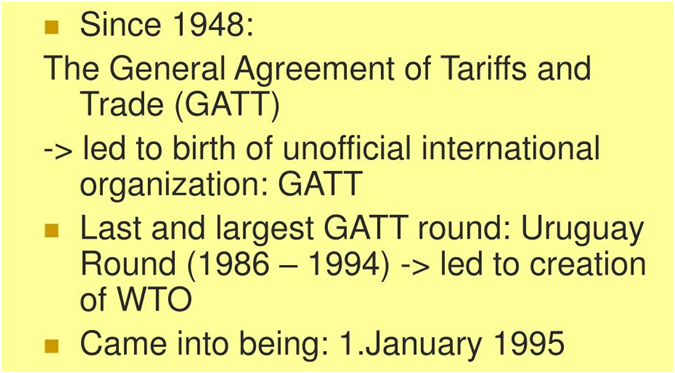GLOBALISATION
Definition: Globalisation means integrating the national economy with the world economy through removal of barriers ot international trade and capital movements.
- Globalization is generally understood to mean the integration of the economy of the co with the world economy.
- However, it is a complex phenomenon. It is an outcome of the set of various policies that aim to transform the world towards greater interdependence and integration.
- It involves creation of networks and activities transcending economic and social geographical boundaries. In short, globalization aims to create a borderless world.
Changes made by the Globalisation of the Indian Economy
- The New Economic Policy prepared a specified list of high technology and high investment priority industries, in which automatic permission will be available for foreign direct investment up to 51 per cent of foreign equity.
- In respect of foreign technology agreements, automatic permission is provided in high-priority industries up to a sum of rupees 1 crore. No permission is now required for hiring foreign technicians or for testing indigenously developed technology abroad.
- In order to make international adjustments to the Indian currency, the rupee was devalued in July 1991 by nearly 20 percent. It stimulated exports, discouraged imports and raised the influx of foreign capital.
- To integrate the Indian economy with the world, the Union Budget 1992-93 made the Indian rupee partially convertible and then the rupee was made fully convertible in the 1993-94 budget.
- A new five-year export-import policy (1992-97) was announced by the Government to establish the framework for globalization of India's foreign trade. The policy removed all restrictions and controls on the external trade and allowed market forces to play a greater role in respect of exports and imports.
- In order to bring the Indian economy within the ambit of global competition, the government has modified the customs duty to a considerable extent. Accordingly, the peak rate of customs duty has been reduced from 250 per cent to 10 per cent in 2007-2008 budget.
Positive and Negative Traits of Globalisation
In Favour of Globalisation:
- Greater access to global markets;
- Advanced technology:
- Better future prospects for large industries of developing countries to become important players in the international arena.
Against Globalisation
- Benefits of globalization accrue more to developed countries, as they are able to expand their markets in other countries.
- Globalization compromises the welfare and identity of people belonging to poor countries.
- Market-driven globalization increases the economic disparities among nations and people.
Outsourcing
Definition: Outsourcing refers to contracting out some of its activities to a third party, which were earlier performed by the organisation. For example, many companies have started outsourcing security services to outside agencies on a contractual basis.
- Outsourcing is one of the important outcomes of the globalization process.
- It has intensified in recent times because of the growth of fast modes of communication, particularly the growth of Information Technology (IT).
- With the help of modern telecommunication links, the text, voice and visual data in respect of these services is digitized and transmitted in real-time over continents and national boundaries. IT Industry is seen as a major
- India has become a favorite destination of outsourcing for most contributor to India's exports of the MNC's because of love age rates and availability of skilled labor. For example, Indian Business Process Outsourcing (BPO) companies are already gaining prominence and earning precious foreign exchange.
- Some of the services outsourced to India include:
- Voice-based business processes (known as BPO or Call Centres);
- Record keeping: The age of outsourcing
- Accountancy; has generated employment
- Banking services; opportunities through Call Centres
- Music Recording;
- Film editing
- Book transcription;
- Clinical advice, etc.
World Trade Organisation (WTO)

- Prior to WTO, General Agreement on Trade and Tariff (GATT) was established as global trade organization, in 1948 with 20 countries.
- GATT was set up to administer all multilateral trade agreements by providing equal opportunities to all countries in the international market. WTO was founded in 1995 as the successor organization to the GATT.
- The WTO agreements cover trade in goods as well as services, to facilitate international trade.
- At present, there are 164 member countries of WTO, The World Trade Organization (WTO) intends to supervise, all the members are required to abide by laws, and policies to liberalize international trade framed under WTO rules.
- As an important member of WTO, India has been at the forefront of framing fair global rules, and regulations and advocating the interests of the developing world.
- India has kept its commitments made to the WTO. India has taken reasonable steps to liberalize trade by removing quantitative restrictions on imports and reducing tariff rates
- Some Major Functions of WTO:
- To facilitate international trade (both bilateral and multilateral trade) through the removal of the tariff as well as non-tariff barriers;
- To establish a rule-based trading regime, in which nations cannot place arbitrary restrictions on trade;
- To enlarge production and trade of services;
- To ensure optimum utilization of world resources; and
- To protect the environment.
Important Terms
- Bilateral Trade: Trade between two countries is known as Bilateral Trade.
- Multi-lateral Trade: Trade between more than two countries is known as Multi-lateral Trade.
- Tariff Barriers: The barriers which are imposed on imports to make them relatively costly and to protect domestic production, are known as Tariff Barriers.
- Non-Tariff Barriers: The barriers, which are imposed on the number of imports and exports, are known as Non-Tariff Barriers.

 PathSet Publications
PathSet Publications
